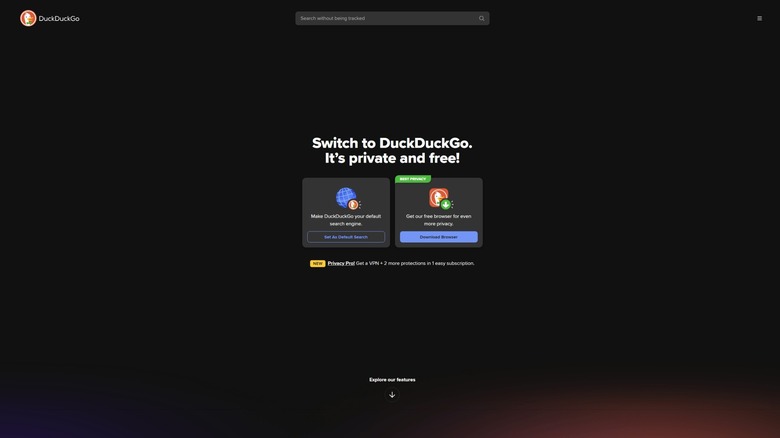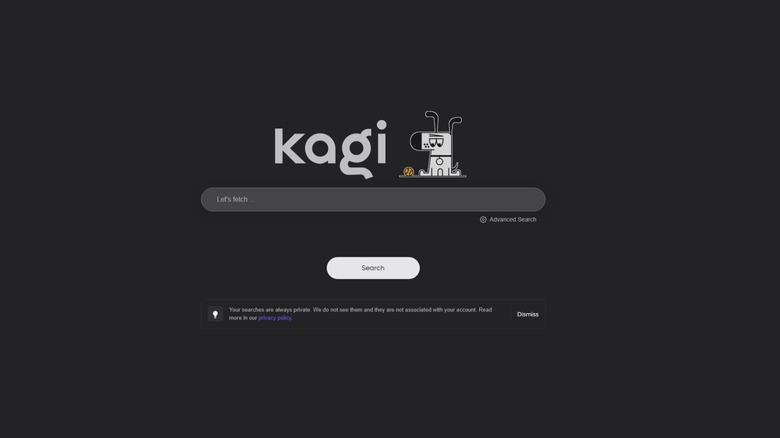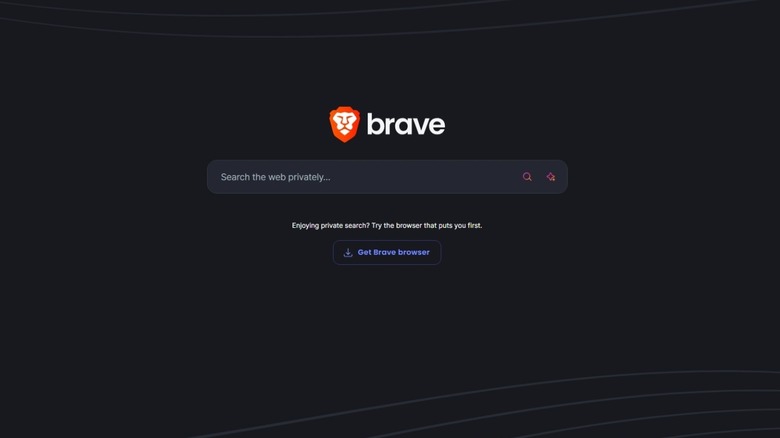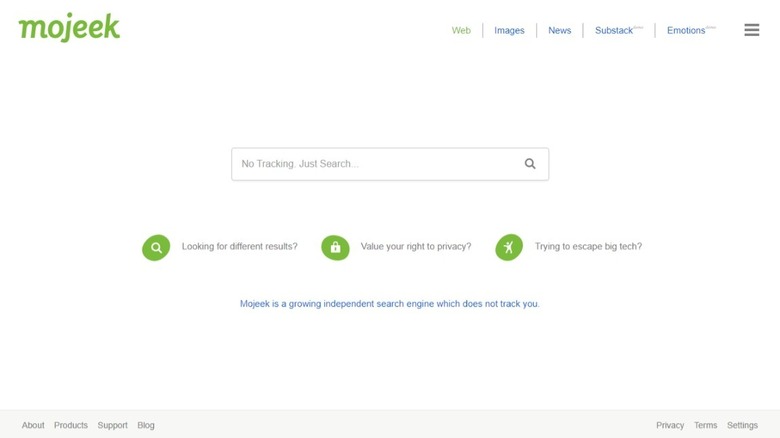6 Alternative Search Engines To Google, And Why You Might Want To Try Them
As Google grew in size and influence over the years, the tech giant also grew to exercise an awful lot of power over the shape of the internet, and its data-hungry tendrils reach into nearly every facet of online life. Google is tracking your devices. It tracks search and browsing history in your Chrome browser, your smartphone, and most web pages you visit.
At the same time, it highly influences what people publish online and has given rise to an entire SEO industry, since any webpage that doesn't satisfy its opaque requirements is doomed to languish in obscurity. End users and publishers were largely willing to ignore Google's privacy concerns and search rankings so long as it kept delivering users to the right places on the web . For a while, it felt like a good deal. But that arrangement increasingly feels one-sided as search results degrade and AI Overviews tell people to eat glue.
If you're feeling tired of Google, or maybe just curious about other search engines, there's no judgment here. We've gone through the best Google alternatives so you don't have to, exploring what makes each of its many competitors unique. You may be surprised to find that there are search engines you've never heard of, or that some of the ones you have heard of are better than you thought. So without any further preamble, let's dive in and help you complete your search for a better internet search engine.
Privacy-minded folks may prefer DuckDuckGo to Google
Some DuckDuckGo users have a habit of proselytizing their search engine. They'll tell you it doesn't track you like Google or Microsoft, that it in fact blocks tracking scripts, and that it only serves ads based on your current search. All of that is true according to DuckDuckGo, but how great is it at the most basic function of being a search engine that can find relevant content on the Internet? Pretty great, as it turns out. Not only does DuckDuckGo search appear to consistently surface high quality results, but its fast and unobtrusive interface make sorting through those results less of a slog compared to Google.
DuckDuckGo does offer an AI chatbot these days. However, it sets itself apart on this front using the same privacy-forward strategy it employed for web searches. It claims that it won't log your chats or use them for training. However, it offers ChatGPT and Claude models, which means that someone's data was pilfered to make the AI possible, even if not your own.
Kagi is a subscription-based alternative to Google
Okay, so you've tried all the popular search engines and you still can't shake the feeling that they're prioritizing other things over your search experience. Maybe it's time to admit that you get what you pay for, and that's where Kagi comes in. Kagi is a subscription-based search engine, and while it might seem weird to pay for web searches, the company claims to have a unique value proposition. Instead of monetizing free search with spammy ads that degrade your results, Kagi takes your money up front so it can give you a completely unbiased search. The good news is, Kagi will let you trial its search service, giving you 100 free searches before asking you to cough up $5 a month for the basic version.
Like Google, Kagi now provides AI answers, but unlike Google's AI Overviews, Kagis' generated summaries are user initiated, which feels less intrusive. Its Lenses feature lets you search only in certain indexes like Fediverse or Usenet. And you can also choose from a list of other search engines to send your query to if Kagi's results don't cut it. That openness is part of its model because, after all, you're already paying for Kagi. That means it doesn't care if it sends your traffic over to Google or Bing because it's not competing for your traffic to serve ads.
Bing gives you ChatGPT (and its search is actually fine)
Look, Bing is Bing. You know it exists, and maybe you've avoided it based on reputation alone. But when Google is busy telling people to eat glue (Literally, its AI Overviews told one user to try adding glue to pizza to help the cheese adhere to it.), perhaps it's high time to give Microsoft's search engine another chance to prove itself.
If you love AI, then you'll enjoy having free access to premium GPT models inside of Bing, like the GPT-4 powered Deep Search feature. What's nice is that Bing sticks the AI stuff into a side panel with related searches so that traditional web results can take center stage, and the AI features feel less intrusive than some of the other engines.
The downside of Bing is that the homepage is stuffed to the gills with distractions. There's Microsoft Rewards, a spammy Microsoft news feed, and even the "Bing homepage quiz" that tests whether you know geography facts based on the daily background image. With enough fiddling in settings, most of the bloat can be turned off, but it shouldn't be there in the first place. That's sort of the Bing story in a nutshell: It has some genuinely useful features that get buried amid a lot of clutter. Still, it's a valid search engine if Google is no longer an option for you.
Brave Search is another privacy centric Google alternative
Another privacy-centric alternative to Google Search is Brave Search. Brave's primary product is the Brave Browser, a Chromium-based web browser that also puts privacy at the forefront. Brave also launched its own, bespoke search engine with an index it claims was built completely from scratch.
Brave Search is privacy-centric but, like most of its competitors, includes an AI search summary feature. Like Google, it will default to showing AI answers for certain queries at the top of the page. Also like Google, Brave Search provides no clear way of disabling these AI results without multiple clicks into settings. A good number of people would probably like the option to at least choose whether they'll be confronted with possibly incorrect AI answers every time they search the web, so putting that option front and center may have been better.
Unlike Google, Brave claims that it will never track your searches, your device information, or any other personal information. However, it will collect anonymous usage metrics unless you opt out, and it will use anonymous data to deliver location-based results. Both of those require a deep dive into settings to disable. Overall, Brave seems like a decent alternative to Google for those who want a more private search experience.
Mojeek is another privacy focused Google alternative
Next up is Mojeek, another search engine that stakes its reputation on claims of user privacy. Like Brave Search and DuckDuckGo, Mojeek claims that it never tracks users. It searches based on its own index and has its own web crawler, MojeekBot. The company also claims to have its own, proprietary ranking algorithm that should differentiate its results from those surfaced by Google or Bing.
Like the competition, Mojeek does have an AI summary feature, but unlike some others, it seems conflicted about that decision. In a blog post, Mojeek noted, "We support the open web and have concerns about the current [AI] trend." Mojeek also explained that it respects robots.txt and includes citations with back links in-line with AI summaries. Additionally, it claims that rather than a preassembled dataset, AI summaries are generated by feeding the search results of each query to the LLM.
Settings for Mojeek are plentiful, with unique options like the ability to tab over to a Substack-only search, which is a helpful addition for those who like to seek out independent writing. You can also choose how many news results to display, which is great for those who want more or less news items to surface. Overall, Mojeek is a thoughtful Google alternative.
Wolfram Alpha is a number-crunching wiz
Wolfram Alpha is technically not a search engine and calls itself a "computational knowledge engine." That's because it doesn't search the web. Instead, it answers questions and calculations by referring to the Wolfram Knowledgebase, an repository of structured data containing — you guessed it — knowledge about subjects from math to history and everything in between. You can't use it to find traditional web results, but if you're stuck on a tricky algebra problem or need to know the chemical composition of something, it's the first place you should check.
Wolfram Alpha has two modes, one for natural language inputs and one for math inputs. The former is where you'd ask generalized questions, while the latter is where you would enter math problems with specific formulas and specialized characters. Although Wolfram has been around for years, it is in many ways more useful than newer technologies like large language model AIs. That's because, unlike Bing's Copilot or Google's Gemini, Wolfram Alpha does not suffer from hallucinations, a problem that plagues AI in which the bots tell users incorrect or confusing information.
On the other hand, it cannot handle natural language inputs as well as AI, so you have to be very specific when crafting your query, mostly relying on proper nouns and precise terminology for anything other than math. Still, if you're looking for an alternative to Google, Wolfram Alpha is hard to beat for general knowledge queries.






